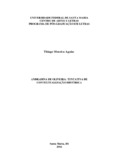| dc.creator | Aguiar, Thiago Moreira | |
| dc.date.accessioned | 2016-07-11 | |
| dc.date.available | 2016-07-11 | |
| dc.date.issued | 2016-02-29 | |
| dc.identifier.citation | AGUIAR, Thiago Moreira. ANDRADINA DE OLIVEIRA: ATTEMPT TO HISTORICAL CONTEXTUALIZATION. 2016. 112 f. Dissertação (Mestrado em Letras) - Universidade Federal de Santa Maria, santa Maria, 2016. | por |
| dc.identifier.uri | http://repositorio.ufsm.br/handle/1/9952 | |
| dc.description.abstract | From the novel analysis O perdão (1910), by Andradina de Oliveira, we intend to draw a concise profile of literary discourses of the late nineteenth and early twentieth centuries, in cow-puncher society. To this end, we seek a dialogue on the differences and similarities of views between female and male authors in the representation of historical issues within the literary discourse. For the success of this study, we propose a brief mapping of the comparative method to explore the fictional representations that consecrated the regionalist literature of the time, idealizing the cow-puncher stereotype about the female voice of Andradina de Oliveira and his plots aimed at the urban population of Porto Alegre. Associated with this purpose, we will establish some deliberations on the contributions of cultural history and new critical perspectives that flourished there about gender relations, mostly from the sixties and seventies of the twentieth century. It has as a guiding principle, a reflection on the issue of own females and their role in the social, involving the context in which these texts were written, reinforcing the critical position that the analyzed romance establishes with the silences of official history. Besides, the scope of this work is based on the precepts of representation and the theoretical basis for such research proposed so far: Roger Chartier, Michelet Perrot, Anselmo Peres Alós, Rita Terezinha Schmidt, Sandra Pesavento, among others. The purpose is to keep the analysis of the novel turned toward the representation of women in sul-rio-grandense fiction, drawing parallel some considerations on regionalist novels of the same period. With particular attention to the construction of women's subjectivity and accordingly to the possibilities of (un) naturalization of concept solid identity of feminine stereotypes, as well as (un) mytification of the "gaucho". | eng |
| dc.format | application/pdf | por |
| dc.language | por | por |
| dc.publisher | Universidade Federal de Santa Maria | por |
| dc.rights | Acesso Aberto | por |
| dc.subject | Autoria feminina | por |
| dc.subject | Gênero | por |
| dc.subject | História | por |
| dc.subject | Representação | por |
| dc.subject | Female authorship | eng |
| dc.subject | Gender | eng |
| dc.subject | History | eng |
| dc.subject | Representation | eng |
| dc.title | Andradina de Oliveira: tentativa de contextualização histórica | por |
| dc.title.alternative | Andradina de Oliveira: attempt to historical contextualization | eng |
| dc.type | Dissertação | por |
| dc.description.resumo | A partir análise do romance O perdão (1910), de Andradina de Oliveira, pretende-se traçar um perfil mais conciso dos discursos literários de fins do século XIX e início do XX, na sociedade gaúcha. Para tanto, busca-se um diálogo nas diferenças e semelhanças das visões entre a autoria feminina e a masculina na representação de questões históricas dentro do discurso literário. Para o êxito deste trabalho, propomos um breve mapeamento do método comparatista para explorar as representações ficcionais que consagravam a literatura regionalista da época, idealizando o estereótipo gaúcho, em relação à voz feminina de Andradina de Oliveira e suas tramas voltadas ao universo urbano de Porto Alegre. Associado a este intuito, estabeleceremos algumas deliberações sobre as contribuições da História Cultural e as novas perspectivas críticas que daí floresceram sobre as relações de gênero, principalmente a partir das décadas de sessenta e setenta do século XX. Tem-se como princípio norteador uma reflexão sobre a questão do próprio gênero feminino e a sua atuação na seara social, envolvendo o contexto em que tais textos foram escritos, reforçando a posição crítica que o romance analisado estabelece com os silenciamentos da história oficial. Além disso, o escopo deste trabalho apoia-se nos preceitos da representação, tendo como base de teórica para tais investigações propostas até aqui Roger Chartier, Michelet Perrot, Anselmo Peres Alós, Rita Terezinha Schmidt, Sandra Pesavento, entre outros. O objetivo é manter a análise do romance direcionada para a representação das mulheres na ficção sul-rio-grandense, traçando em paralelo algumas considerações sobre romances regionalistas do mesmo período. Atentando especialmente para a construção da subjetividade da mulher e, consequentemente, para as possibilidades de (des) naturalização do conceito de identidade sólida dos estereótipos femininos, assim como da mitificação do gaúcho. | por |
| dc.contributor.advisor1 | Alós, Anselmo Peres | |
| dc.contributor.advisor1Lattes | http://lattes.cnpq.br/4335387854670599 | por |
| dc.contributor.referee1 | Kunze, Daniela Lindenmeyer | |
| dc.contributor.referee1Lattes | http://lattes.cnpq.br/4835772559750373 | por |
| dc.contributor.referee2 | Felippe, Renata Farias de | |
| dc.contributor.referee2Lattes | http://lattes.cnpq.br/5454806173934935 | por |
| dc.creator.Lattes | http://lattes.cnpq.br/0753712963993965 | por |
| dc.publisher.country | BR | por |
| dc.publisher.department | Letras | por |
| dc.publisher.initials | UFSM | por |
| dc.publisher.program | Programa de Pós-Graduação em Letras | por |
| dc.subject.cnpq | CNPQ::LINGUISTICA, LETRAS E ARTES::LETRAS | por |


